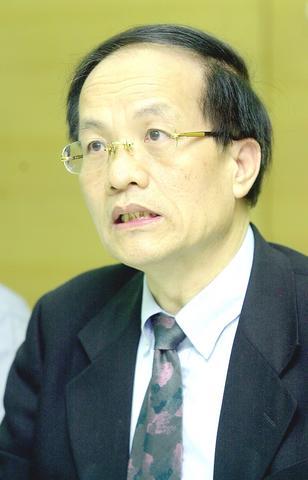As soon as Minister without Portfolio Chen Chi-nan (陳其南) was appointed as Chairman of the Council for Cultural Affairs, he pledged to implement the idea of "establishing the nation with culture" and to advance the Council to Ministry of Cultural Affairs.
"Cultural policies do not only deal with the issues of how to allot budgets and resources but to find out a guiding principle to establish platforms for diverse ethnic groups' development," Chen said when he started in his new position on Thursday.
"It is also urgent to reconcile the social confrontations caused by the election with stressing civic, community and ethnic consciousness," Chen said.

TAIPEI TIMES FILE PHOTO
Perhaps no one was more proficient in the administrative affairs and practices of the council than Chen, who served as its vice chairman from 1994 to 1997.
Since 1994, Chen has been noted for his efforts to promote the policy of "Holistic Community Building," a policy dedicated to creating unique local community cultures around the nation by arousing the residents' communal and civic consciousness. It also seeks to create a new society and culture that contains the different cultures of diverse ethnic groups in Taiwan.
He has promoted the idea of "decentralization," stressing that to reshape the images of Taiwan's cultures, quality of life must be raised and environmental transformation must be based on the autonomy of local communities and grassroots groups.
"What is most lacking in Taiwan society is a common consensus about the basic-level structure of the land," Chen said.
"If we establish a common consciousness from the level of community, then whether to unify with China or be independent from China will not be a problem for Taiwan."
Chen's ideas were highly valued by then president Lee Teng-hui (李登輝), who later interpreted Chen's discourse into the so-called "life community," an idea that called on the people of Taiwan to build a strong sense of common destiny and identity, as everyone has roots here.
Chen also contributed many ideas in the Creativity and Culture Industry Development Project and New Homeland Movement carried out by outgoing Council chairwoman Tchen Yu-chiou (
It is said that Chen's appointment also breaks the unwritten rule that a woman should head the council, as in the past 10 years. Since 1993, the heads were Sheng Hsueh-yung (申學庸); Cheng Su-ming (鄭淑敏), now chairwoman of the China Television Company; Helen Lin (林澄枝), vice chairwoman of the Chinese Nationalist Party (KMT); and outgoing council chairwoman Tchen Yu-chiou.
With a master's degree in anthropology from the National Taiwan University and a doctorate of anthropology from Yale, Chen first devoted himself to academic research at Academia Sinica's Institute of Ethnology and has taught anthropology at the Chinese University of Hong Kong, the University of Virginia in the US and the college of humanities and social sciences at National Chiao-tung University (
Chen later held offices in governmental departments and was praised by the public for his "outstanding" performances. He worked as a consultant to Premier Yu Shyi-kun on cultural affairs when Yu served as Ilan County Commissioner in 1997 and 1998.
He was appointed as a national policy advisor in 1999 by President Chen Shui-bian (
Hu Tai-li (
"Chen could often carve out many refreshing ideas and terms that affect and stimulated people." Hu said.
"I expect him to contribute his creativity and energy to his new job and find a balance between practice and theory by fine-tuning his measures."

Taiwan is stepping up plans to create self-sufficient supply chains for combat drones and increase foreign orders from the US to counter China’s numerical superiority, a defense official said on Saturday. Commenting on condition of anonymity, the official said the nation’s armed forces are in agreement with US Admiral Samuel Paparo’s assessment that Taiwan’s military must be prepared to turn the nation’s waters into a “hellscape” for the Chinese People’s Liberation Army (PLA). Paparo, the commander of the US Indo-Pacific Command, reiterated the concept during a Congressional hearing in Washington on Wednesday. He first coined the term in a security conference last

DEFENSE: The National Security Bureau promised to expand communication and intelligence cooperation with global partners and enhance its strategic analytical skills China has not only increased military exercises and “gray zone” tactics against Taiwan this year, but also continues to recruit military personnel for espionage, the National Security Bureau (NSB) said yesterday in a report to the Legislative Yuan. The bureau submitted the report ahead of NSB Director-General Tsai Ming-yen’s (蔡明彥) appearance before the Foreign and National Defense Committee today. Last year, the Chinese People’s Liberation Army (PLA) conducted “Joint Sword-2024A and B” military exercises targeting Taiwan and carried out 40 combat readiness patrols, the bureau said. In addition, Chinese military aircraft entered Taiwan’s airspace 3,070 times last year, up about

A magnitude 4.3 earthquake struck eastern Taiwan's Hualien County at 8:31am today, according to the Central Weather Administration (CWA). The epicenter of the temblor was located in Hualien County, about 70.3 kilometers south southwest of Hualien County Hall, at a depth of 23.2km, according to the administration. There were no immediate reports of damage resulting from the quake. The earthquake's intensity, which gauges the actual effect of a temblor, was highest in Taitung County, where it measured 3 on Taiwan's 7-tier intensity scale. The quake also measured an intensity of 2 in Hualien and Nantou counties, the CWA said.

The Overseas Community Affairs Council (OCAC) yesterday announced a fundraising campaign to support survivors of the magnitude 7.7 earthquake that struck Myanmar on March 28, with two prayer events scheduled in Taipei and Taichung later this week. “While initial rescue operations have concluded [in Myanmar], many survivors are now facing increasingly difficult living conditions,” OCAC Minister Hsu Chia-ching (徐佳青) told a news conference in Taipei. The fundraising campaign, which runs through May 31, is focused on supporting the reconstruction of damaged overseas compatriot schools, assisting students from Myanmar in Taiwan, and providing essential items, such as drinking water, food and medical supplies,